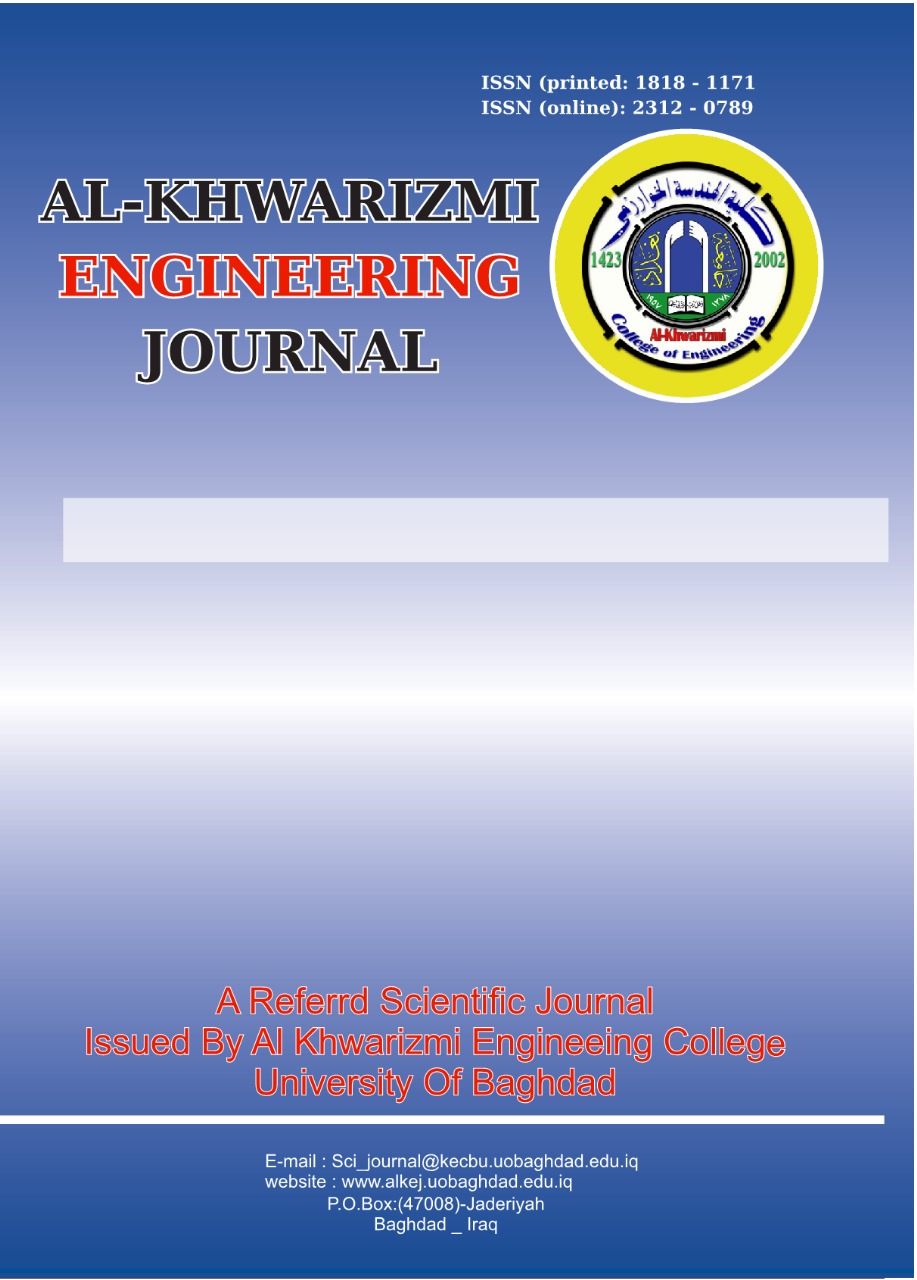Abstract
An investigation was conducted to suggest relations for estimating yield and properties of the improved light lubricating oil fraction produced from furfural extraction process by using specified regression.
Mass transfer in mixer-settler has been studied. Mass transfer coefficient of continuous phase, mass transfer coefficient of dispersed phase and the overall mass transfer coefficient extraction of light lubes oil distillate fraction by furfural are calculated in addition to all physical properties of individual components and the extraction mixtures.
The effect of extraction variables were studied such as extraction temperature which ranges from 70 to 110°C and solvent to oil ratio which ranges from 1:1 to 4:1 (wt/wt) were studied.
The results of this investigation show that the extract yield E decreased with decreasing solvent to oil ratio in extract layer and increased with increasing temperature. The fraction of total solvent in the raffinate phase decreased with increasing oil to solvent ratio in raffinate layer and increased with increasing temperature. Solvent to oil ratio in extract layer decreased with increasing temperature and increased with increasing solvent to charge oil ratio at constant temperature. Oil to solvent ratio in raffinate decreased with increasing temperature and increased with increasing solvent to charge oil ratio at constant temperature.
Estimated functions are the best modeling function for prediction extraction data at various operating conditions.
Mass transfer coefficient of continuous phase kc and mass transfer coefficient of dispersed phase kd are increased with increasing temperature and solvent charge to oil ratio at constant temperature. The over all mass transfer coefficient Kod is increased with increasing temperature and solvent to charge oil ratio; while Kod a is increased with temperature and decreased with solvent to charge oil ratio.
Mass transfer in mixer-settler has been studied. Mass transfer coefficient of continuous phase, mass transfer coefficient of dispersed phase and the overall mass transfer coefficient extraction of light lubes oil distillate fraction by furfural are calculated in addition to all physical properties of individual components and the extraction mixtures.
The effect of extraction variables were studied such as extraction temperature which ranges from 70 to 110°C and solvent to oil ratio which ranges from 1:1 to 4:1 (wt/wt) were studied.
The results of this investigation show that the extract yield E decreased with decreasing solvent to oil ratio in extract layer and increased with increasing temperature. The fraction of total solvent in the raffinate phase decreased with increasing oil to solvent ratio in raffinate layer and increased with increasing temperature. Solvent to oil ratio in extract layer decreased with increasing temperature and increased with increasing solvent to charge oil ratio at constant temperature. Oil to solvent ratio in raffinate decreased with increasing temperature and increased with increasing solvent to charge oil ratio at constant temperature.
Estimated functions are the best modeling function for prediction extraction data at various operating conditions.
Mass transfer coefficient of continuous phase kc and mass transfer coefficient of dispersed phase kd are increased with increasing temperature and solvent charge to oil ratio at constant temperature. The over all mass transfer coefficient Kod is increased with increasing temperature and solvent to charge oil ratio; while Kod a is increased with temperature and decreased with solvent to charge oil ratio.
Keywords
furfural
Lube oil
Mass Transfer Coefficient
modeling
solvent extraction
Abstract
تناول هذا البحث ايجاد علاقات لحساب الناتج والخواص لمقطع زيت التزييت الخفيف المحسن من عملية الاستخلاص بالفرفورال باستخدام موديلات رياضية.تم دراسة انتقال المادة في نظام الخلط والفصل تم حساب معامل انتقال المادة في الطور المستمر ومعامل انتقال المادة في الطور المشتت ومعامل انتقال المادة الكلي لعملية الاستخلاص لمقطع زيت التزيت الخفيف بواسطة الفرفورال بالاضافة الى كل الخواص الفيزياوية للمركبات كل على حده وخلائط نظام الاستخلاص . تم دراسة المتغيرات المؤثرة على عملية الاستخلاص والتي هي درجة حرارة الاستخلاص وتتراوح من 70 الى 110°م، والمتغير الأخر هو نسبة المذيب الى الزيت وتتراوح من 1:1 الى 1:4 .
اظهرت نتائج هذا البحث بان ناتج الاستخلاص يقل بنقصان نسبة المذيب الى زيت التزييت في طبقة المستخلص ويزداد بزيادة درجة الحرارة . إن نسبة المذيب الكلي في طور الرافيينت يقل بزيادة نسبة زيت التزييت الى المذيب في طبقة الرافيينت ويزداد بزيادة درحة الحرارة .إن نسبة المذيب إلى الزيت في طور الاستخلاص يقل بزيادة درجة الحرارة ويزداد بزيادة نسبة المذيب الى زيت التزييت اللقيم بثبوت درجة الحرارة. إن نسبة زيت التزييت الى المذيب في الرافينيت يقل بزيادة درجة الحرارة ويزداد بزيادة نسبة المذيب الى زيت التزييت اللقيم بثبوت درجة الحرارة .
ان الدوال الرياضية التي تم اقتراحها هي تعتبر من افضل الموديلات الرياضية لتمثيل نظام الاستخلاص هذا بمختلف الظروف التشغيلية.
يزداد معامل انتقال المادة في الطور المستمر ومعامل انتقال المادة في الطور المشتت بزيادة درجة الحرارة ونسبة المذيب الى زيت التزييت اللقيم بثبوت درجة الحرارة. يزداد معامل انتقال المادة الكلي بزيادة درجة الحرارة ونسبة المذيب الى زيت التزييت اللقيم بينما يزدادa Kod بزيادة درجة الحرارة ويقل بزيادة نسبة المذيب الى زيت التزييت اللقيم.
اظهرت نتائج هذا البحث بان ناتج الاستخلاص يقل بنقصان نسبة المذيب الى زيت التزييت في طبقة المستخلص ويزداد بزيادة درجة الحرارة . إن نسبة المذيب الكلي في طور الرافيينت يقل بزيادة نسبة زيت التزييت الى المذيب في طبقة الرافيينت ويزداد بزيادة درحة الحرارة .إن نسبة المذيب إلى الزيت في طور الاستخلاص يقل بزيادة درجة الحرارة ويزداد بزيادة نسبة المذيب الى زيت التزييت اللقيم بثبوت درجة الحرارة. إن نسبة زيت التزييت الى المذيب في الرافينيت يقل بزيادة درجة الحرارة ويزداد بزيادة نسبة المذيب الى زيت التزييت اللقيم بثبوت درجة الحرارة .
ان الدوال الرياضية التي تم اقتراحها هي تعتبر من افضل الموديلات الرياضية لتمثيل نظام الاستخلاص هذا بمختلف الظروف التشغيلية.
يزداد معامل انتقال المادة في الطور المستمر ومعامل انتقال المادة في الطور المشتت بزيادة درجة الحرارة ونسبة المذيب الى زيت التزييت اللقيم بثبوت درجة الحرارة. يزداد معامل انتقال المادة الكلي بزيادة درجة الحرارة ونسبة المذيب الى زيت التزييت اللقيم بينما يزدادa Kod بزيادة درجة الحرارة ويقل بزيادة نسبة المذيب الى زيت التزييت اللقيم.
